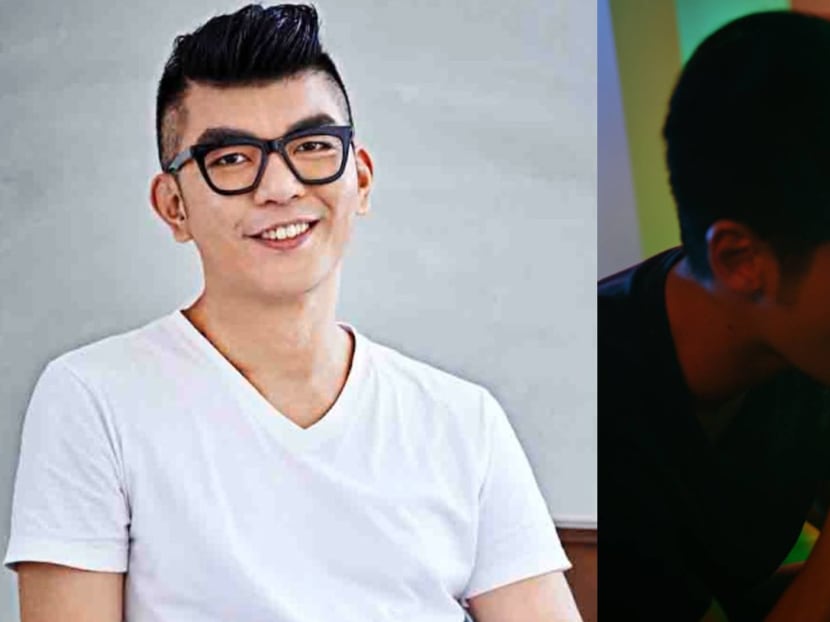Royston Tan On His Interactive Film High, And The New Movie He Can’t Complete Because Of The COVID-19 Pandemic
The filmmaker also tells us about the old buildings stock footage he’s been collecting.
For Singapore’s first interactive film, High, Royston Tan has to shoot multiple endings, something he’s not used to doing, not even for his own feature narratives, from his coming-of-age debut 15 to the ge-tai themed 881 to the enigmatic drama 4:30.
“My endings have always been a little bit ambiguous,” Tan, 43, tells 8days.sg over the phone. “I left them open-ended because I want the audience to decide for themselves — what is the ending about?”
“In a sense, you can call them interactive but in an unconventional way,” adds Tan, who calls the anti-drugs abuse short an interactive film for the Tinder age”.
In High — a collaboration with the National Council Against Drug Abuse (NCADA) — viewers get to choose the fate(s) awaiting Nick (Titoudao: Inspired by the True Story of a Wayang Star’s Shawn Thia), a young bloke who’s introduced to the destructive world of drugs and hard-partying by Sienna (Naomi Yeo), a woman he meets on a dating app.
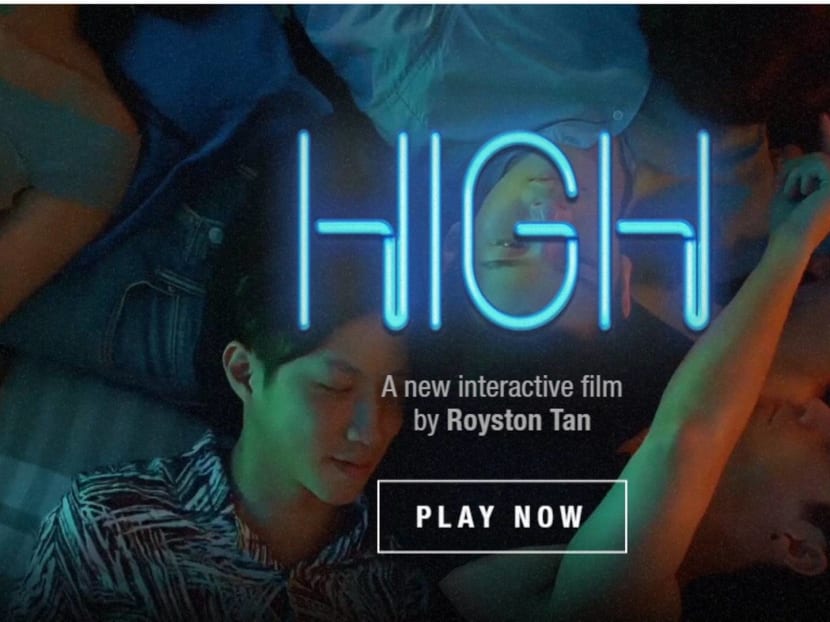
All in all, there are four endings in High.
Here, we ask the director if the interactive component might be a tad gimmicky and get in the way of the anti-drugs message.
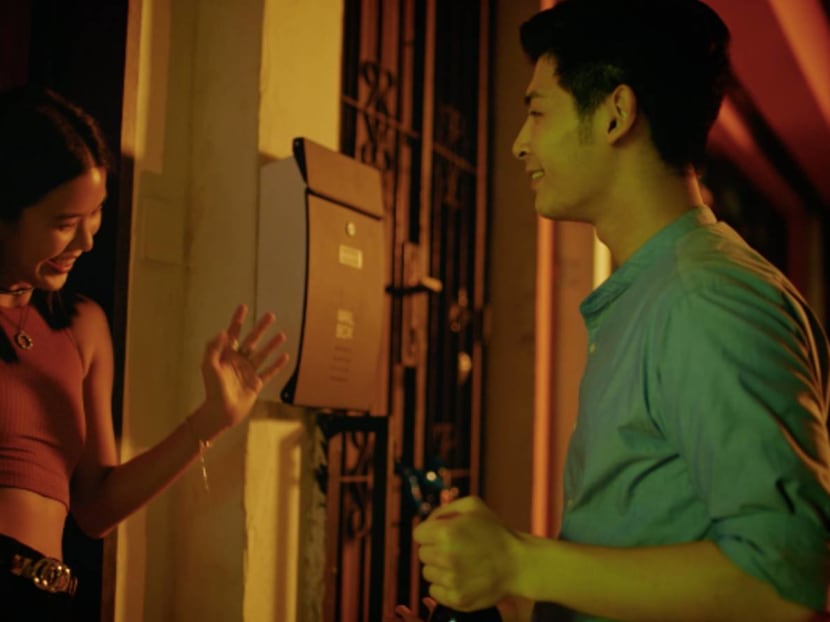
8 DAYS: Do you know why NCADA and Dentsu Aegis Network Singapore approach you for High? Did they single out something you’d done that makes you the perfect guy for the project?
[Scriptwriter He] Shuming and I wanted to make a drug abuse film. We had been developing it for a while when they approached us. I also don’t know why they approached me! [Probably] because they think I have] connections (laughs). What was really exciting is it’s the first interactive film in Singapore — I’m always up for something new.
Did High start out as an interactive film?
The one I initially thought of was a very simple narrative film. It was the agency who said, “Let’s make it interactive!”
You wanted to make a horror film about drug abuse. Did you ask your actors to watch any drug-related TV shows or movies before filming?
There were a few things we did. Firstly, we got them to do their own research on the effects of drug abuse. So they know how it feels like going down the spiral. Secondly, we got them to do this psychological thing, almost like a counselling session. We got them to open up, so that they are able to portray that vulnerability. Thirdly, we also had ex-drug addicts to talk to them. Basically, we didn’t want to demonise anybody. We wanted a human approach to the story. There were a lot — a lot — of rehearsals. I think Shumin also wanted to make sure that the actors own the characters, especially Sienna, played by Naomi Yeo. Certain scenes are very critical for her. We need to show her vulnerable side.
How about yourself?
I obviously watched that Black Mirror episode [Banders to see how [the interactive narrative] works. But honestly, [High] is based on characters who are very close in my social circle. We kept in touch with them, and even during filming, I would call them up [for advice]. I try to make it as close as possible to real-life. So I actually got the most inspiration from them.
You have a thing for having numbers in your film titles. If you were to replace High with a number, what would it be?
This is a tough one. I was trying to figure out this question too (laughs). If I really have to make a decision, it has to be 1.0, that kind of thing. It could be + 1 or -1, to reflect the outcome of an action.
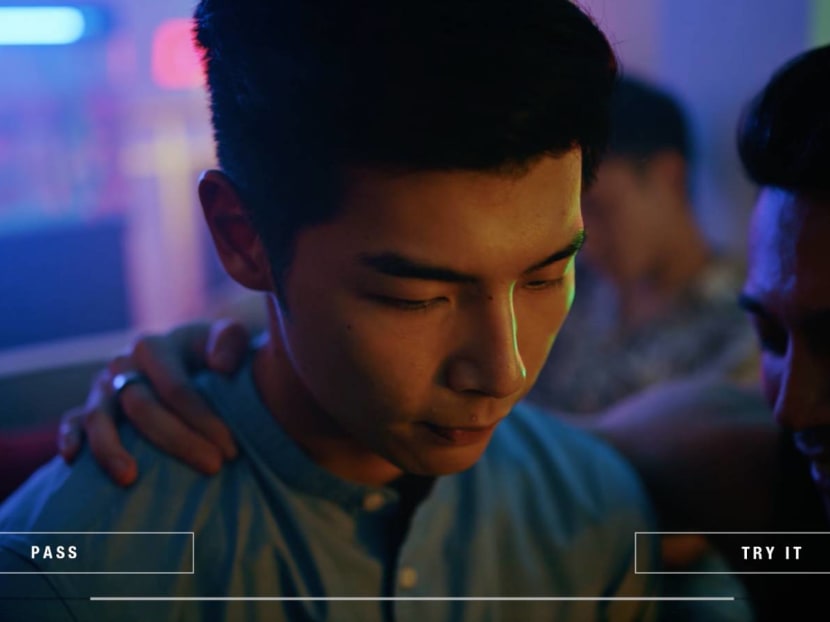
The interactive component is interesting but it’s also very gimmicky. Do you think that might overshadow the message?
I was very careful on this. Firstly, I need to have enough visual [content] to entice the audience, so that they will continue to play this film. Secondly, I have a message to say, which is for the viewer to reflect on the consequences of meth abuse. I try to [balance the two] delicately. I hope I did it [right].
Do you think High will get through to the young people? We already have problems trying to get them to take safe-distancing seriously.
These young people are from a new generation. When you talk to them, they will give you a blank face but yet on social media, they have another persona. The only way to talk to them is by social media. It’s interesting how they took on personas that are different from their real self. It’s quite trippy to actually understand this new concept. I’ve been giving talks at schools for 11 years and every year I see how the students changed and evolved. I also have to evolve and speak their language.
How do you stay relevant in youth culture?
To be honest, when NCADA showed me the list of drugs, I got the shock of my life: a lot of drugs I don’t recognised (laughs). I feel so outdated! It’s my daily homework to talk to young people. I keep my social circle very wide, I have friends from all walks of life. What makes you ‘current’ is the nutrients extracted from the environment around you. I think the environment around me helped me to be open. For example, I have a minister who is a good friend. I also have a friend who’s a massage parlour lady working near my place. So there’s no judgement from both sides. I get to see both sides of their story. Both I give respect (laughs).
When you first started out, you have this reputation of being a rebel because of 15 and Cut, a satirical short film on censorship. But look at you now. You’ve worked on the National Day Parade. You were the creative director on the ‘Majulah Singapura’ music video. You also directed the Mediacorp dialect sitcom Eat Already? Do you still see yourself as a rebel? Or as has age mellowed you?
I don’t think age has mellowed me. There are certain things I still feel very strongly against, and censorship is definitely one of them. Until today I will not give in. I can do Cut 2, 3, 4, 5, 6 and 7, no problem (laughs). But also I think in recent years, I found a common ground to speak with the government. On the campaigns they allow me to work on, I would tell them, “You cannot go a top-down approach, you need to listen to the voice of the people.” It becomes more of a collaboration. The environment has kind of changed quite a lot. So sometimes I do tell them that, “Hey, there are certain things that can be done in other ways. We don’t have to do it this way.” [But] I still think I’m a rebel.
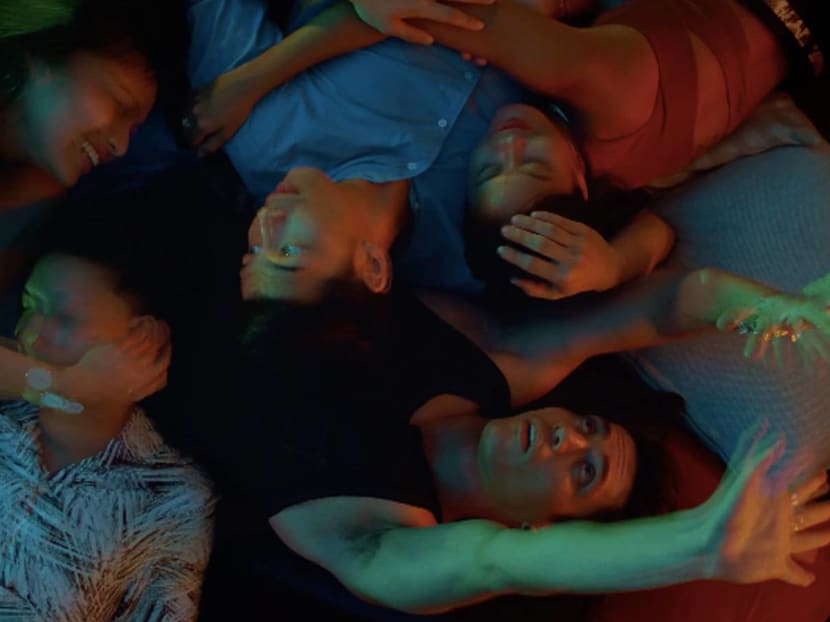
I’m a big fan of your Old Friends documentary trilogy…
We are going to launch them online next month!
If you ever stop making features, you should just stick to making documentaries.
I am very nostalgic by heart. I’m 43. I grew up [at a time when the country was going through a] transitional stage. We saw a lot things changing. As a result, we start to appreciate things that were disappearing very, very fast. I am very worried that all these old places disappearing. Of course, the Ministers say that old buildings can be torn down and the new generation can build new memories. When I heard about this, that’s when I realise there is a crisis. If we slowly erased our past, we would lose our sense of belonging. When you lose your sense of belonging, you lose the love for your country.
Tell me about it. I stay in the East and I was really sad when the old Republic cinema at Marine Parade was torn down a few years ago.
And I filmed it before it was torn down. Our warehouse has a collection of stock footage of different vintage places I have filmed. I just want to archive them as much I can . The footage hasn't been used yet. These little archival shots, even without music, are time capsules on their own. They’re so precious. The younger generation has to know these places. It’s always through these old places and the people describing [their memories of these places], that you start to understand it’s not about the places but the people sharing the stories. You get to know about one another a little bit more. That human connection is important for me.
Are you still making movies?
To be honest, I miss making feature films and I am currently making one. I have three scenes left but due to the COVID-19, I cannot complete it. It requires me to go to China. If you ask me if I’m still a rebel, my next film is going to get banned. Confirmed!
Eat Already! and Titoudao: Inspired by the True Story of a Wayang Star are streaming on meWATCH. You can watch High at high.sg NCADA is also running a social media contest from Mar 26 to Apr 3. Visit High's Instagram page on Mar 30 and Apr 2 at 10am. To enter just answer posed questions about specific scenes in the film. Three participants with the fastest and most accurate answers stand to win prizes such as JBL X Under Armour True Wireless Flash earphones and Grab vouchers.Photos: NCADA

